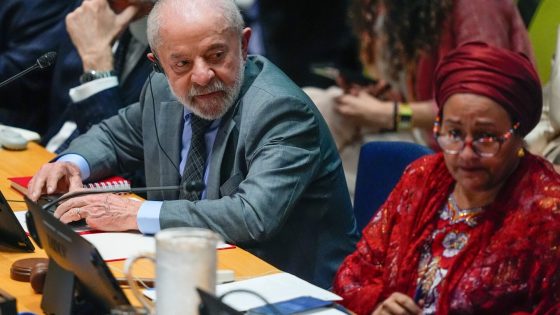On September 25, 2025, the United Nations reported that China, the world’s largest carbon polluting nation, announced its first emission reduction target during a high-level climate summit. This development signals increased global efforts to combat climate change and extreme weather events.
- China commits to 7-10% emission cuts by 2035
- Global leaders emphasize urgency in climate action
- EU plans to cut emissions by 66-72%
- Scientists warn of irreversible climate change impacts
- Countries need to submit stronger climate plans soon
Chinese President Xi Jinping committed China to a 7% to 10% reduction in emissions by 2035, aiming to increase wind and solar energy sixfold from 2020 levels. China accounts for over 31% of global carbon dioxide emissions, which have long been rising. The announcement coincided with over 100 world leaders emphasizing the urgency of reducing heat-trapping gases ahead of upcoming negotiations in Brazil. During a special UN summit, nations responsible for about two-thirds of global emissions presented plans to curb fossil fuel use. Xi also pledged to mainstream pollution-free vehicles and establish a climate-adaptive society. Meanwhile, the European Union proposed a target range of 66% to 72% emissions reduction, but experts warn these goals are insufficient to prevent climate catastrophe. The summit highlighted the need for stronger commitments, with leaders like Lula da Silva and Australian Prime Minister Albanese stressing the importance of urgent climate action amid rising disasters. Climate scientists warned that global warming is accelerating, with every tenth of a degree increasing the risk of severe weather and ecological impacts. The UN urges countries to submit more ambitious plans before the November negotiations to stay within the 1.5°C warming limit, which the world is already close to exceeding. Despite China’s new pledge, critics say the targets are too modest given its clean energy potential. The summit underscores the critical need for immediate, stronger action to prevent irreversible climate damage.
- Countries must submit enhanced five-year climate plans by the end of September to inform global warming estimates.
- Leaders should increase investments in renewable energy and phase out fossil fuels faster.
- International cooperation must intensify to hold major emitters accountable for their targets.
- Scientists recommend immediate policy changes to limit warming to 1.5°C and avoid irreversible impacts.
The summit demonstrated a growing recognition of climate urgency, but the effectiveness of announced targets remains uncertain. Future negotiations will test whether nations can translate commitments into meaningful reductions that safeguard global ecosystems and economies.



























